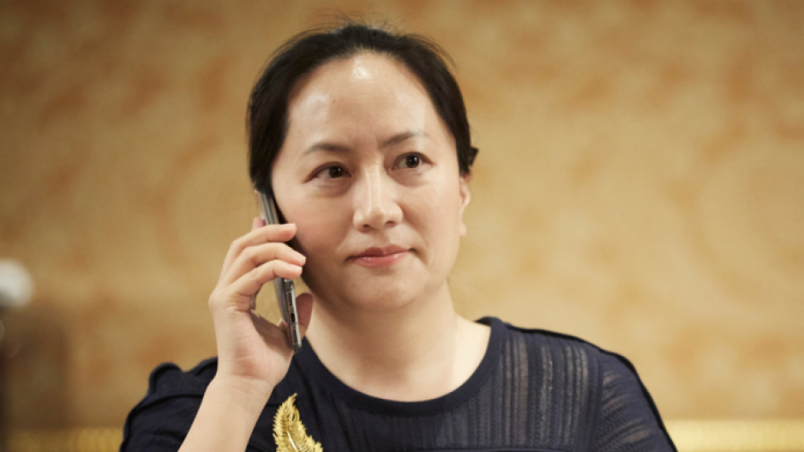Huawei Technologies CFO Meng Wanzhou has been officially discharged from her extradition case by judge Heather Holmes.
Holmes made the announcement after a brief hearing this afternoon in the wake of the U.S. reaching a deferred prosecution agreement with Meng that will allow the Chinese tech executive to return to China.
“It appears that this extradition proceeding has reached its final chapter,” said Crown counsel John Gibb-Carsley said after telling the court that the authority to proceed in the case has been withdrawn from the Attorney General’s Office.
In a short speech outside the court, Meng said her life in the past three years had been "turned upside down."
She thanked her supporters and the Chinese embassy in Canada for making her time in Vancouver comfortable with "kindness." She then left with her team. The entire Vancouver court appearance took less than 20 minutes to complete.
The Chinese tech exec then left the courthouse in her usual black SUV security detail. Various reports indicated she headed straight to Vancouver International Airport, where she left Canada after almost three years of fighting extradition to the United States.
Meng appeared in a virtual U.S. court proceeding earlier this morning, where she pleaded not guilty to charges of fraud and money laundering. But prosecutors said that they have agreed to defer prosecution on the case to Dec.1, 2022 - exactly four years after her arrest in Vancouver.
As part of the agreement, Meng has agreed to a number of obligations. If she does not violate them before the 2022 date, U.S. prosecutors have agreed to drop the case against her.
Meng has also agreed not to challenge a statement of facts presented by prosecutors. Those statements include an admission where Meng knowingly misrepresented Huawei’s relationship with subsidiary Skycom to HSBC in 2013 - and that Meng failed to “retract or amend” any of the false statements.
”In entering into the deferred prosecution agreement, Meng has taken responsibility for her principal role in perpetrating a scheme to defraud a global financial institution,” said Acting U.S. Attorney Nicole Boeckmann for the Eastern District of New York in a written statement.
“This Deferred Prosecution Agreement will lead to the end of the ongoing extradition proceedings in Canada, which otherwise could have continued for many months, if not years,” said Acting Assistant Attorney General Mark J. Lesko for the Justice Department’s National Security Division in the same U.S. statement.
Reports from last week indicated that a deal to defer her charges of fraud and money laundering from the United States was again under discussion between the two sides, and the Huawei executive‘s U.S. lawyers later confirmed a deal has in fact been reached. They also reiterated Meng remains confident in her innocence.
”I'm very pleased that Sabrina Meng and the U.S. Department of Justice have reached a deferred prosecution agreement (DPA) and it has been approved by Judge Donnelly,” said lawyer William W. Taylor III.
“Under the terms of this agreement, Ms. Meng will not be prosecuted further in the United States and the extradition proceedings in Canada will be terminated. She has not pleaded guilty and we fully expect the indictment will be dismissed with prejudice after fourteen months. Now, she will be free to return home to be with her family.”
In U.S. court, authorities said they will now recommend the release of Meng on personal recognizance bond - and a withdrawal of the extradition request will be filed with the Canadian Department of Justice. U.S. judge Ann Donnelly accepted the agreement, officially setting in motion the likely end of Meng’s extradition case.
A personal recognizance, in U.S. legal terms, is “a release, without the requirement of a posting bail, based on a written promise by the defendant to appear in court when required to do so,” according to a description by the Cornell Law School.
On the Canadian front, B.C. Supreme Court has announced at 11:36 a.m. that a 2pm hearing on the extradition case was to take place at the Vancouver courthouse. Given the developments, most expected the eventual outcome - that Meng will have had her extradition stayed.
Meng left her Shaughnessy home at approximately 9:19 a.m. this morning, escorted by Huawei officials and her usual court-appointed security detail. She did not respond to questions, simply greeting the photographers gathered at her driveway entrance with a “good morning, everyone.”
The Meng case has been one of the highest-profile extradition cases in Canadian history since her arrest in Vancouver on December 1, 2018. The case – where Canadian authorities arrested Meng on a U.S. extradition request – dragged Canada-China relations to an all-time low and put Ottawa in the middle of a global dispute between Washington and Beijing.
Meng has maintained her innocence regarding accusations of wrongdoing surrounding a Huawei subsidiary’s business dealings in Iran. She was originally scheduled to appear October 21 in a case-management hearing in her extradition proceedings to determine when Canadian courts will announce the decision on her case.
It was initially unclear whether the development will affect the possible release of Michael Kovrig and Michael Spavor, two Canadians held by Beijing on espionage charges since Meng’s arrest in Canada. But late Friday, Canadian Prime Minister Justin Trudeau announced the two Michaels have indeed been released and are on their way back to Canada as Meng makes her way back to China.





